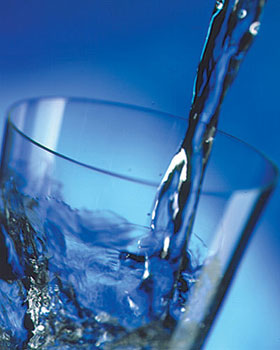 Almighty Allah created all of our bodily needs with perfect systems. The two examples you will read on this page are of the best proofs of this…
Almighty Allah created all of our bodily needs with perfect systems. The two examples you will read on this page are of the best proofs of this…
“Have you considered the water which you drink? Is it you that send it down from the clouds, or are We the senders? If We pleased We would have made it salty; why do you not then give thanks?” (Surat al-Waqia, 68-70)
While a person can live for one to two weeks without food, he cannot live more than three or four days without drinking water. The human body, which consists of 55 to 75 percent of water, loses two to three liters of water per day depending on activities such as respiration and breathing. The water lost is compensated with the water that is drunk after the sense of thirst.
What If You Never Got Thirsty?
Water is the most important source of life for human beings, as it is for all living beings. It is used in almost all functions in the body from the regulation of body temperature, the transportation of nutrients and oxygen, expelling waste products from the cells and easing digestion. In addition, it protects the organs and tissues. For example, when we lose only two percent of the water that surround our cells, we face a 20% loss of energy and feel tired. Even this is enough to understand how important water is for human life. (Harun Yahya, The Miracle of Human)
The Water Detective: The Hypothalamus
There are systems which detect even the smallest changes taking place in the amount of water that is so important for the human body. The most notable of these is the hypothalmus, a region in our brain no larger than a bean. The hypothalamus immediately senses when the water level in our blood drops. And as a precaution against this, the pituitary gland, itself only one centimeter in size, and located just underneath the hypothalamus begins to secrete a hormone called “ADH.”
This hormone takes a long trip via the circulatory system and reaches the kidneys. In the kidneys, there are special receivers that fit this hormone, like a lock and key combination. When hormones reach these receivers, water disposal is applied and kept at a minimum level.
If the pituitary gland and the kidney cells, which understand and carry out the command “decrease water consumption” brought by this hormone, did not exist, we would need to drink 15 to 20 liters of water per day simply not to die of dehydration. Since we would need to dispose of the water continuously, it would not be possible to sleep or stay in one place for too long.
The Sense of Thirst
This perfect system established by the hypothalamus, pituitary gland and ADH working together flawlessly is not enough for us to survive. We need to know that we have to drink water – and how much we need to drink. Therefore, Allah created man with the sense of thirst. Let us assume that everything is flawless in our body, but that we did not get thirsty. We would die of thirst shortly after we were born. Since we did not have a sense of thirst, we would not realize why our bodies were in a state of crisis, and we were at risk of dying through dehydration . However, a person knows that he needs to drink water from the moment of his birth and how much water to drink, because we get thirsty in a perfect ratio to restore balance to our bodies. By means of this vital system created flawlessly the water balance in our body is protected.
Besides all of these, water, which is created according to this want of the body, is only one of the evidences of Allah’s infinite Creation.
The Miraculous Effect of Sleep on Memory
Allah created sleep for human beings specially with many wonders.
However, Almighty Allah reveals this situation in the Qur’an as follows:
“It is He Who made the night a cloak for you and sleep a rest, and He made the day a time for rising." (Surat al-Furqan, 47)
It is very common that a person may not remember the name of a very reputable place, someone’s name or a date at first thought. Sometimes, no matter how much you think, you cannot remember the name you forgot; so, you begin to work on something else and then you remember the answer to your question.
Secrets of the Human Mind
Remembering something forgotten is like making a demand of an archivist to bring back an image that is long missing. As science discovers the boundaries of the human mind, it is better understood how large a capacity the human memory has. If we think that every sensation is stored for a lifetime, it would be clear how big the human memory’s capacity to store is. Scientists have recently begun to discover these miraculous systems, and only partially.
When you are asleep, your mind is busy storing the images of the day inside a permanent storage. Therefore, as scientists note, sleep is not a loss of time, but rather a highly important process.
According to research published in Science News, which is one of the prominent scientific publications of the world, people remember things better after a good night’s sleep. According to this, while you are sleeping, the memory is busy storing the information learned before sleep. Today, when the boundaries of memory are being better understood, it is proven that sleep is not a passive activity through the existence of mental activities, and not just about the repair and renewal activities that take place in the body.
The Relationship Between Sleep and Memory In the experiments conducted by the neurobiologists of the University of McNill, it was proven that the group that slept right after learning a new subject showed a better performance. According to Karim Nader, who has an article about this subject in Nature magazine, memory is not static and it can be stored again and again. (Karim Nader, "Neuroscience: Re-recording human memories," Nature 425, 571 - 572 (09 October 2003); doi:10.1038/425571a.). Nader continues his statements in his article from a quotation from Fenn: "The identification made right after the training points to an important improvement in performance, but this progress decreases throughout the day and turns back to its original form right after sleep. So sleep helps information learned any time during the day to be kept in mind. A reformation in performance also shows us that presentation and mapping given to us together with general information are increased and strengthened during sleep.“ (Fenn et al., "Consolidation during sleep of perceptual learning of spoken language," Nature 425, 614 - 616 (09 October 2003); doi:10.1038/nature01951.)."
In the experiments conducted by the neurobiologists of the University of McNill, it was proven that the group that slept right after learning a new subject showed a better performance. According to Karim Nader, who has an article about this subject in Nature magazine, memory is not static and it can be stored again and again. (Karim Nader, "Neuroscience: Re-recording human memories," Nature 425, 571 - 572 (09 October 2003); doi:10.1038/425571a.). Nader continues his statements in his article from a quotation from Fenn: "The identification made right after the training points to an important improvement in performance, but this progress decreases throughout the day and turns back to its original form right after sleep. So sleep helps information learned any time during the day to be kept in mind. A reformation in performance also shows us that presentation and mapping given to us together with general information are increased and strengthened during sleep.“ (Fenn et al., "Consolidation during sleep of perceptual learning of spoken language," Nature 425, 614 - 616 (09 October 2003); doi:10.1038/nature01951.)."
The Similar Principle Used in Computer Networks
The researcher Walker adds these about the relationship between human memory and sleep: "Sleeping before taking action consolidates the need for memory consolidation.“(Walker et al., "Dissociable stages of human memory consolidation and reconsolidation," Nature 425, 616 - 620 (09 October 2003); doi:10.1038/nature01930.)."
Today a similar principle to the human mind is used in computer networks. Advanced computer networks no longer back information up in a single place. Instead, they use storage devices made up of advanced source disc and tapes (SAN-Storage Area Network). These is done by smart software that backs up imagery actively. An image can be instantly backed up, but it is sent to a permanent storage place later on; for example at night when computers are in sleep mode.


